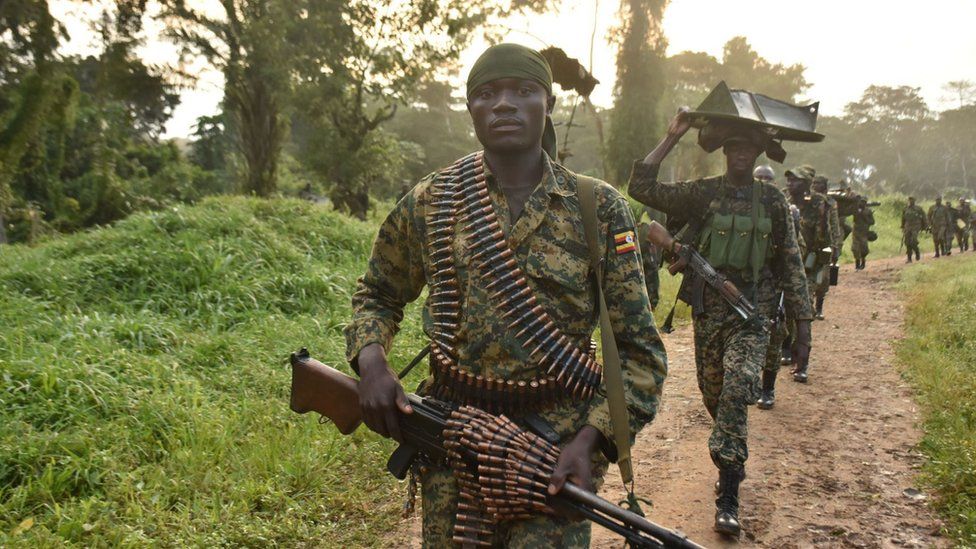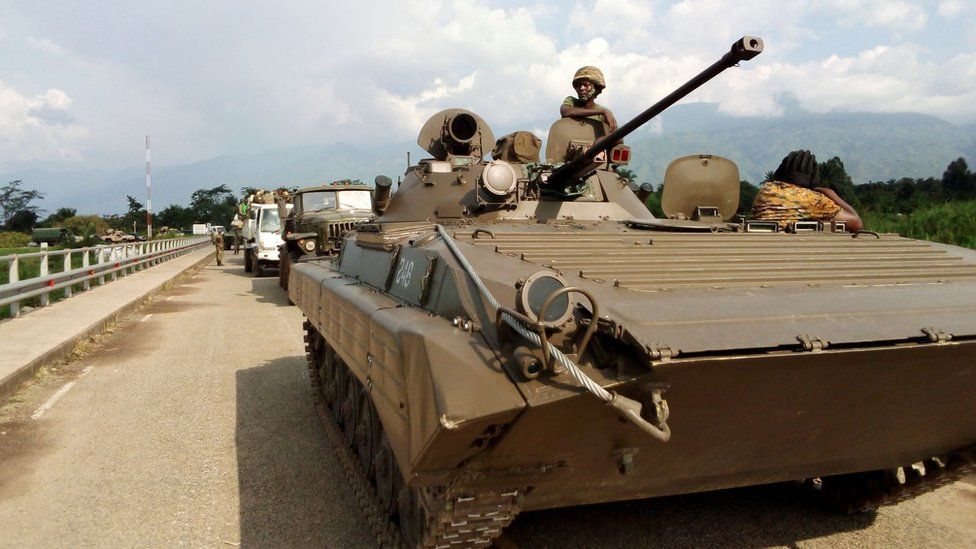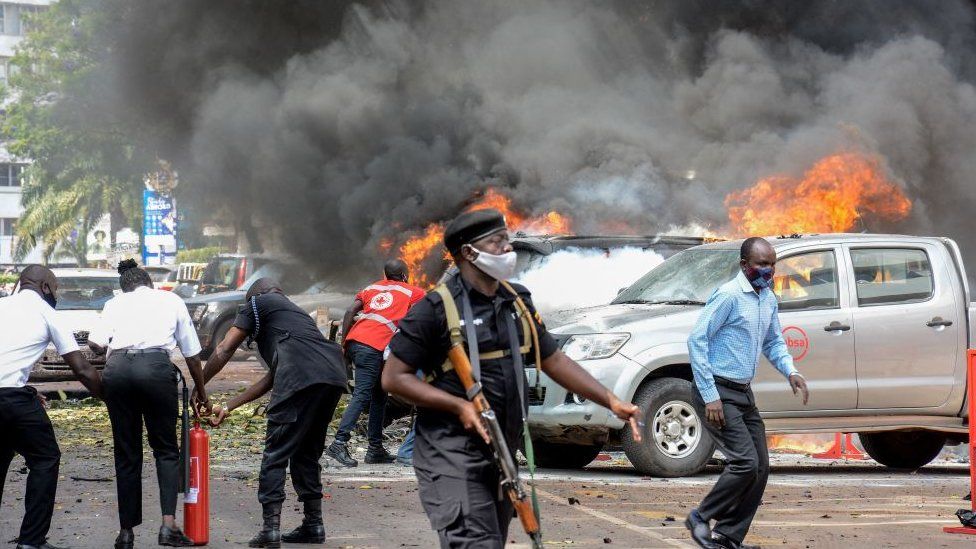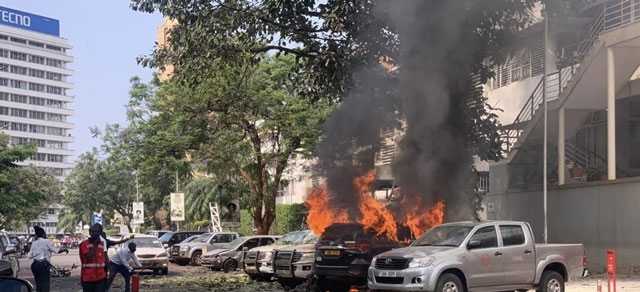
My analysis
Museveni has previously used the war on terror to access funding worth billions of dollars from western donors. Slave states like Uganda are just pawns in the neo-liberal game of looting resources from the African continent. Babylon USA can sponsor the lies on all global media houses like CNN, BBC, Aljazeera etc. about the legitimacy of Museveni’s war against ADF in DR Congo. However, so many things do not add up. How can a suicide bomber target places like the central police station when soft targets like Nakasero market and Owino market are close by??? Where is the video of the Islamic state terrorists claiming responsibility for the Kampala twin bombings?? This has nothing to do with ADF. It is about using mercenary armies like Museveni’s UPDF to open DR Congo to Western Looters. Museveni and all his lying western cronies are of their father the devil who is the father of all lies(John 8:44). Let us watch as the lies and contradictions come to fore.
Must Read
It is a neo-liberal ploy to loot Congo resources Stupid! US backed M23 rebels fighting in eastern Congo force hundreds into Uganda
https://watchmanafrica.blogspot.com/2021/11/it-is-neo-liberal-ploy-to-loot-congo.html

Helping US corporations and Neo-liberal slave states to primitively accumulate mineral resources in DR Congo: Uganda to build 223km road network inside DRC: Feeding your neighbour’s kids as your own kids starve to death is a very bogus idea
https://watchmanafrica.blogspot.com/2020/10/helping-us-corporations-and-neo-liberal.html
Uganda goes after ADF in Congo bases, denies claims of bombing civilian homes
https://www.theeastafrican.co.ke/tea/news/east-africa/uganda-goes-after-adf-in-congo-bases-3641010
Saturday December 04 2021
By JONATHAN KAMOGA
By JULIUS BARIGABAUganda on Friday dismissed as “baseless propaganda” reports that its airstrikes and artillery bombardments launched at several bases of the Allied Democratic Forces (ADF) in the Eastern Congo provinces of North Kivu and Ituri killed civilians.
This come barely days after Uganda People’s Defence Forces (UPDF) and their Congolese counterparts announced that they had started joint military operations against the ADF rebels. Kampala blames the rebel outfit of orchestrating a series of attacks on its soil, with the most recent a twin bombing in Kampala that killed three and injured over 20 people.
The UPDF carried out a series of air strikes against the ADF militants in DRC on Tuesday, an offensive that Ugandan officials said was intended to drive the militants out of their bases.
The Ugandan military bombed four bases in two locations of Beni and Ituri in North Kivu provinces according to security sources, with one of the locations believed to be the ADF headquarters and home to its top commander Musa Baluku. However, hours later report emerged that the ADF fled their camps before the aerial and artillery bombardments launched from Uganda territory on November 30.
“Clearly, that is propaganda. No one has been to these camps yet, not even our forces. We maintain that we hit our targets, and any other information is baseless,” said Brig Flavia Byekwaso, the Uganda Peoples Defence Forces spokesperson. Brig Byekwaso said the aerial raids were carried out to surprise the enemy and isolate the bases, therefore no one can claim to have details of those bombardments.
UN agencies, independent sources and non-governmental organisations that track conflict in the volatile eastern Congo told The EastAfrican that they had not picked up any information to this effect.

Why Ugandan troops have entered DR Congo - again
https://www.bbc.com/news/world-africa-59507543
By Patience Atuhaire
BBC News, Kampala
Ugandan forces have once again crossed the country's western border to go into the Democratic Republic of Congo.
Previous incursions have been extremely controversial with troops in the past fighting soldiers from Rwanda, carrying out atrocities and plundering the country's natural resources.
But this time it is with the approval of DR Congo's government.
Why are Ugandan troops in DR Congo?
Speaking a few days after a suicide attack last month in the heart of the capital, Kampala, President Yoweri Museveni called on those responsible to surrender: "My advice to all of them… if they do not come out, they will die."
The government was clearly determined to pursue the militants wherever they may be.
In the last and most audacious of a series of attacks on 16 November, three bombers blew themselves up and killed at least four others in the process.
The government blamed a militant Islamist rebel group called the Allied Democratic Forces (ADF), which was founded in Uganda but was then forced into DR Congo. It says it is now part of the Islamic state group.
 Image source, AFP
Image source, AFPOn Tuesday, the Ugandan army confirmed that it had carried out airstrikes on ADF targets across the border. Then on Wednesday hundreds of Ugandan troops were seen crossing into DR Congo.
The Congolese government said it had invited its neighbour's armed forces into the country as the ADF is one of many armed groups wreaking havoc in eastern DR Congo.
The ADF, flushed out of Uganda in the early 2000s, has been attacking and looting Congolese villages, killing people and forcefully recruiting children for at least the last decade.

Several dead, dozens injured as suicide bombers hit Uganda's capital Kampala
Issued on:
Two explosions rocked Uganda's capital, Kampala, on Tuesday, killing at least three civilians in what police described as a coordinated attack by extremists opposed to the government.
Three suicide bombers also died in the blasts, police said. The explosions caused chaos in Kampala as terrified residents fled the city's center.
“The bomb threats are still active, especially from suicide attackers,” police spokesman Fred Enanga said, blaming the blasts on the Allied Democratic Forces, an extremist group that is affiliated to the Islamic State group.
The IS group claimed responsibility for the blasts, according to SITE, which tracks the online activities of extremist organizations.
The twin explosions occurred within three minutes of each other. Both were carried out by attackers carrying explosives. A possible attack on a third target was foiled by police who pursued and disarmed a suspected suicide bomber, Enanga said.
Police released security video footage of the precise moments the bombers detonated their devices in the streets, sending clouds of white smoke billowing in the air. Police officers were among the casualties.
“We give thanks to God. He has protected us,” said eyewitness Jane Among near one of the blast scenes. “We first heard a blast, and then when we stayed a little we heard another blast and saw dust all over.”
One blast was near a police station and the other on a street near the parliamentary building, according to police and witnesses. The explosion near parliament appeared to hit closer to a building housing an insurance company and the subsequent fire engulfed cars parked outside. Body parts were seen scattered in the street, and later some lawmakers were seen evacuating the parliamentary building nearby.
At least 33 people are being treated at the city's main public referral hospital, Enanga told reporters. Five are critically injured, he said.
People scampered to leave the city in the aftermath of the attacks, many on passenger motorcycles, as police cordoned wide areas near the blast scenes, footage posted on social media showed.
The US Embassy condemned the bomb attacks “in the strongest terms," extending condolences to the victims' families.
“United States’ support for the Ugandan people is unwavering as we work toward our shared goal of a secure, democratic, and prosperous Uganda,” it said in a statement posted on Twitter.
The United States condemns in the strongest terms today’s terrorist attack in central Kampala. We extend our deepest condolences to the families of those killed, and we wish a speedy recovery to those injured. The United States’ support for the Ugandan people is unwavering...1/2
— U.S. Mission Uganda (@usmissionuganda) November 16, 2021
Ugandan officials have been urging vigilance in the wake of a string of bomb explosions in recent weeks.
One person was killed and at least seven others wounded in an explosion at a restaurant in a suburb of Kampala on Oct. 23.
Another explosion two days later on a passenger bus killed only the suicide bomber, according to police.
Even before those attacks, the UK government had updated its Uganda travel advisory to say extremists “are very likely to try to carry out attacks” in this East African country.
The Allied Democratic Forces, an affiliate of the Islamic State group in central Africa, claimed responsibility for the attack on the restaurant. Enanga, the police spokesman, said Tuesday's attacks bore “the hallmarks” of the work of this group, although there was no immediate claim of responsibility.
At least 150 planned attacks have recently been defused, he said, describing a "domestic terror group” eager to carry out more attacks.
The Allied Democratic Forces has long been opposed to the rule of longtime President Yoweri Museveni, a US security ally who was the first African leader to deploy peacekeepers in Somalia to protect the federal government from the extremist group al-Shabab. In retaliation over Uganda's deployment of troops to Somalia, the group carried out attacks in 2010 that killed at least 70 people who had assembled in public places in Kampala to watch a World Cup soccer game.
But the Allied Democratic Forces, with its local roots, has become a more pressing challenge to Museveni, 77, who has ruled Uganda for 35 years and was reelected to a five-year term in January.
The group was established in the early 1990s by some Ugandan Muslims, who said they had been sidelined by Museveni's policies. At the time, the rebel group staged deadly terrorist attacks in Ugandan villages as well as in the capital, including a 1998 attack in which 80 students were massacred in a frontier town near the Congo border.
A Ugandan military assault later forced the rebels into eastern Congo, where many rebel groups are able to roam free because the central government has limited control there.
Reports of an alliance between the Allied Democratic Forces and the Islamic State group first emerged in 2019, according to SITE.
Uganda is predominantly Christian, and Muslims make up about 14% of the country’s 44 million people.
(AP)